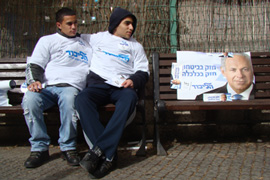‘High’ turnout in Israeli election
Rightist parties expecting big gains in vote overshadowed by security concerns.

The subject of security in the wake of the country’s military offensive in Gaza, overshadowed other issues during the poll run-up, Al Jazeera’s Alex Sehmer in Jerusalem said.
Kadima, headed by Tzipi Livni, the foreign minister, hit the campaign trail hard in the last few days, attempting to close the gap with the opposition Likud party, led by Benyamin Netanyahu.
Agencies reported at 20:00 GMT quoting TV exit polls as showing Kadima stealing a narrow lead over Likud.
Earlier surveys showed Likud likely to win between 25 and 27 seats, and Kadima between 23 and 25 seats.
“It’s a close race. We don’t know whether Likud or Kadima will win but we know the right will get the most votes,” Gil Hoffman, a political analyst and chief correspondent for the Jerusalem Post daily, told Al Jazeera.
‘Rightists rising
The party that could receive the biggest boost to its fortunes is Yisrael Beiteinu, led by Avigdor Lieberman, a Russian immigrant.
Lieberman insists Palestinian-Israeli citizens must swear an oath of loyalty to the country.
| In depth |
 Al Jazeera’s coverage of the Israel elections
|
Yisrael Beiteinu also appears set to push Labor, one of Israel’s big three parties and led by Ehud Barak, the defence minister, into fourth place.
Israel’s rightist parties have made significant gains in the wake of the Gaza conflict, in which over 1,300 Palestinians were killed.
Most Israelis seem to have backed the offensive, which Israel said was in response to incessant rocket fire from Gaza into southern Israel, and Lieberman with his hawkish rhetoric has gained ground in its wake.
Likud, the traditional right, says it would work towards peace from a position of strength.
Kadima, a more centrist party, has promised to continue with the Annapolis peace talks, initiated by George Bush, the former US president.
Undecided voters
Livni struck a confident note on Monday, saying that “victory is in reach” for her Kadima party.
Netanyahu held his own news conference the same day, appearing alongside Yuval Rabin, the son of the late Yitzhak Rabin, a former prime minister assassinated in 1995.
Yuval praised Netanyahu, but the event went badly for Netanyahu after a crowd heckled Yuval and prompted him to admit he would be voting for Labor.
Last week, speaking to a group of West Bank settlers – a bastion of support for Likud – Netanyahu warned voters not to “waste votes on smaller parties”.
Both Likud and Kadima fear that smaller parties would take votes away from them. Yisrael Beiteinu’s growing support is said to come mainly from defecting Likud supporters.
Coalition government
Under the Israeli electoral system, once the results are in, Shimon Peres, the Israeli president, will ask the person deemed most likely to form a coalition to form a government.
The chosen party would be given 28 days to form a coalition, a period which the president is entitled to extend by up to 14 days.
To achieve a majority, a party or coalition must hold more than 60 seats in the 120-seat Knesset.
 |
| Voting got off to a quiet start in Jerusalem on Tuesday because of rain and cold weather |
Polls close at 10pm local time (20:00GMT), having opened at 7am. In keeping with tradition, Israel’s national election day is a public holiday and last night, Jerusalem’s downtown was filled with young revellers.
Early voting took place on Monday in some areas of Israel and the West Bank, with soldiers in remote bases among those allowed to cast their ballot.
Away from Jerusalem, fights broke out in Umm el-Fahm, a mainly Palestinian-Israeli town in Israel’s Haifa district, when police prevented Baruch Marzel, an activist with the Jewish National Front, from observing the elections.
Marzel had applied to observe the elections at Umm el-Fahm, a request granted by Israel’s electoral commission.
But Shimon Koren, commander of the local police, said he had prevented Marzel from entering Umm el-Fahm to maintain order.
Marzel said it was a black day for democracy in Israel.
